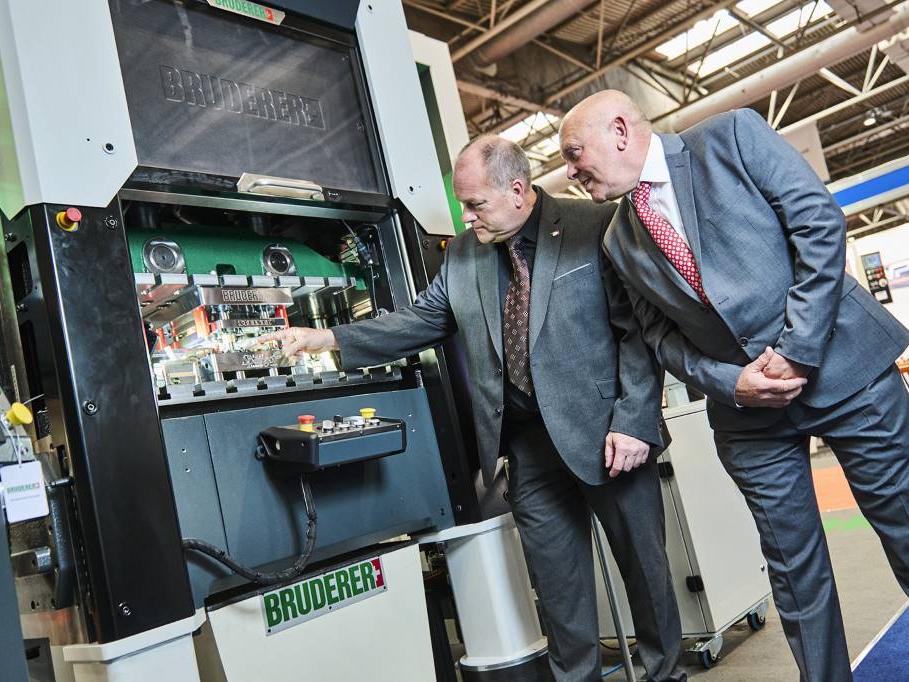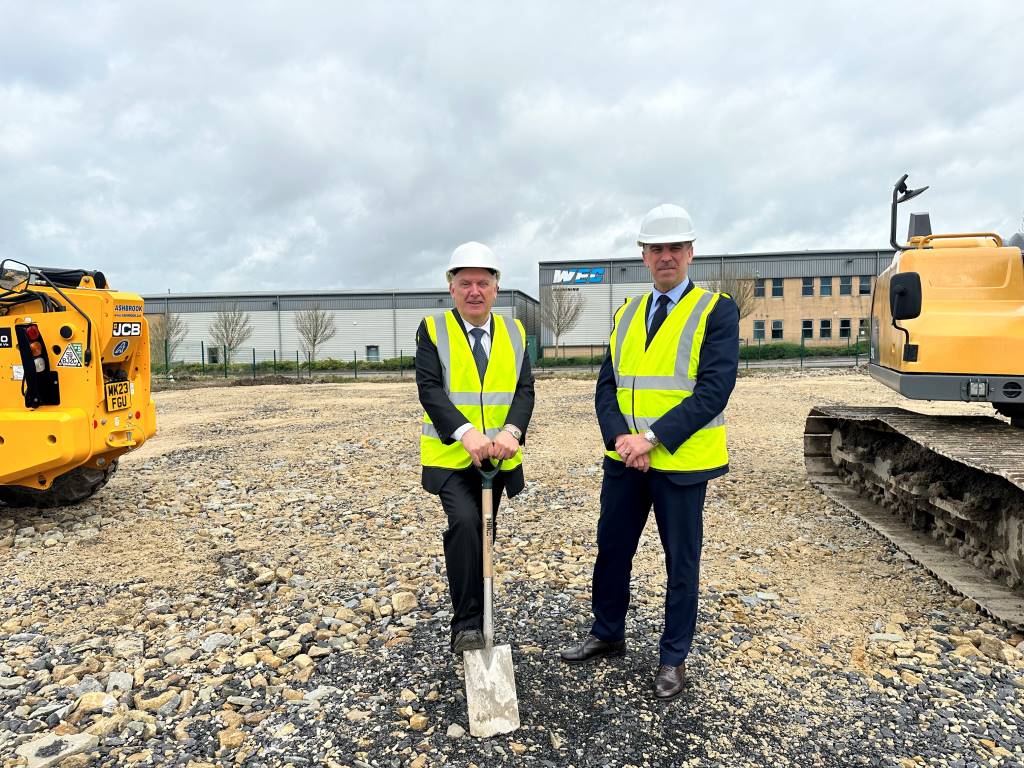Growing organically
If the UK Government needs a few pointers on how manufacturing can really benefit an economy, it could probably learn a lesson or two from Germany – a nation
If the UK Government needs a few pointers on how manufacturing can really benefit an economy, it could probably learn a lesson or two from Germany – a nation that really values its manufacturing heritage. A company typifying these traditional engineering values is family-run tooling manufacturer Guhring. Dave Tudor jetted off to Germany to find out more.
As the ongoing quest for maximising productivity advances relentlessly, tooling manufacturing has become ultra competitive. Although each would probably disagree vehemently, in reality there's probably not much separating the top four or five companies – each produce excellent products and provide high levels of support and engineering expertise – but Guhring is not just a tooling manufacturer.
Although known primarily for its vast range of rotary cutting tools – drills, reamers, gundrills, taps, milling cutters, countersinks, thread cutting tools and toolholders, the company, through the acquisition of Hollfelder in 2007 added adjustable tooling insert solutions to its product portfolio effectively filling a gap in its product range.
But there's a whole lot more to Guhring: it manufacturers its own range of 9-axis CNC grinders entirely for in-house use; it produces its own carbide and develops its own coatings. If that wasn't enough, Guhring also makes its own coating machines and tool vending management systems. This is a company that has not only developed its own range of products – but also the processes and machines used to make those products most efficiently. It's a forward thinking organisation too and invests 5% of its total turnover back into research and development.
Fourth generation
In 1898, Gottlieb Guhring started the company with 17 employees manufacturing a small range of twist drills, spirit levels, screw clamps, fastening chains and plumb bobs. In 1964, the current owner and Gottlieb's grandson, Dr Jörg Gühring joined the company and at a sprightly 76 years old, he still is very much involved in the running of the business. Today, Oliver Gühring represents the fourth generation of the family – sitting alongside his father as part of a four man executive board and taking responsibility for sales and marketing activities. The company employs 5,000 people globally - including 60 at the Birmingham-based Guhring UK facility headed up by managing director, Mike Dinsdale.
“We have a presence now in most countries throughout the world,” Oliver Gühring explains. “There are 46 sales companies globally, 31 production plants and 47 service centres and our tooling range has grown significantly comprising some 1,850 tool types – including 45,000 standard tools. We have also seen phenomenal growth in supplying bespoke, customised tooling,” he adds.
Headquartered in Albstadt, Germany, Guhring has three facilities in this area: the original building where the business began which still manufactures HSS drills and special tooling; a fully functional PCD design and manufacturing facility; and a recently acquired factory in Onstmettingen that is used exclusively for the assembly, service and support of its own range of grinding machines. There's no shortage of space at the Onstmettingen facility – which will come in very handy for future expansion plans.
In addition, a nearby complex in Sigmaringen-Laiz is home to four vital aspects of Guhring's business: R&D; OEM support; the manufacture of carbide tools and taps; and apprentice training. In its tap and threadmill manufacturing plant alone, 60,000 taps are manufactured from start to finish every week. The shopfloor is a hive of activity and about the length of two football pitches. This is highly efficient manufacturing by anyone's standards!
Deep roots
Germany has longstanding, deep rooted links to the automotive industry and so it's not surprising that automotive, combined with aerospace applications accounts for around 40% of Guhring's total business. In fact within the company's OEM division – a department set-up to develop solutions for bespoke, highly complex customer-specific applications – 70% of the projects undertaken are with automotive customers.
“The OEM department needs to be highly flexible because its customers can be machine tool manufacturers or end users,” reveals Manfred Brunsch, general manager of the OEM business “We'll work closely with both but the ultimate focus is providing working solutions to complex manufacturing challenges. We appoint a project leader for each task who will head up a dedicated team that includes design engineers, project engineers and applications engineers. Each solution can be fully trialled and tested here before being passed onto the customer.”
Here the company's automotive expertise really comes to the fore. In 2010 no less than 465 automotive projects were undertaken including developing tooling for 49 cylinder blocks, 38 crankshafts, 25 housings and 15 conrods. The tooling itself comprised complete systems from the spindle to the cutting tool encompassing spindle adaptors, clamping, hydraulic expansion chucks, reduction sleeves and the cutting tool itself, often incorporating MQL as the preferred cooling method.
Not surprising also is that Guhring works closely with many of the world's leading automotive manufacturers including Daimler, GM, Ford, Toyota, Holden Australia, BMW, Audi, Volkswagen and Skoda.
On the aerospace front, Guhring is investing heavily in developing tooling solutions for composite machining – indeed for Airbus Deutschland the company is the main supplier of CFRP tooling. It also has strong links with Rolls-Royce, Boeing and Eurocopter.
I'll get my coat
PCD manufacture is a particular speciality for Guhring and the facility at Albstadt handles the whole process from the PCD itself through to designing and manufacturing tool bodies, regrinding and coating. It's a very busy department, amalgamating a combination of both manual and automated processes. “We produce 800-1,000 tools a day and whilst much of the process makes effective use of modern CNC machine tools, the actual brazing of the diamond blanks onto the tool body is very precise and is still a manual process,” explains production engineer, Tobias Fechner. He's right of course. Mistakes here can be costly and the process requires both concentration and a steady hand.
The PCD department is looking to double in size in the next 12 months. A number of machine tools from WFL, Stama, Traub, Gildemeister, Heller and Grob adorn the shopfloor as well as banks of Guhring's own 9-axis grinding machines. This year the company has invested over £6 million on new equipment and has extended the factory area by 2,000m².
But it's not just PCD manufacturing that is handled by the department. Guhring has developed a number of coatings that it uses across its entire range – from HSS drills through to carbide fluteless taps – and this is applied via the company's own coating machines. A new development in this area is the Signum coating – a TiAlSi nitridic coating that exhibits hardness values of 5,500 Vickers. Originally developed for cast iron, the coating has been used very effectively for milling applications on stainless steel and interestingly, composites. Originally unveiled at EMO in September, the coating will be available in the UK early in 2012 directly from Guhring UK.
The appliance of science
It's easy to forget that behind almost every tooling product is scientific theory. All tooling applications are different and at the advanced end of the scale, R&D is essential to establish optimum cutting performance and efficiency.
R&D is therefore very high on Guhring's agenda and as previously mentioned it allocates 5% of its annual turnover to R&D activities. This is money well spent. With many of its customers involved with highly complex machining operations, the capability of using the latest technology to develop new tools and solutions is invaluable.
Headed up by Immo Garm, the R&D department is where things really get interesting. Establishing reasons for tool failure and wear patterns is one of the most challenging tasks for any tooling manufacturer but Guhring has an impressive arsenal of techniques at its disposal including chip formation simulation, thermal imaging, high speed cameras and an all important Scanning Electron Microscope (SEM) that can provide up to 100,000 x magnification. We're talking micro-geometry analysis here and the SEM is vital for not only measuring tool wear and the existence of built-up layers, but also establishing the chemistry of the wear.
The R&D department is also home to a number of machine tools from Heller, Grob and DMG used for development and investigative purposes. With Minimum Quantity Lubrication (MQL) becoming more popular in advanced machining applications, all machines in the R&D area are fitted with MQL systems from Bielomatic, Lubrix and Vogel.
Building blocks
Guhring's newest acquisition in terms of premises is the machine building facility at Onstmettingen. Purchased in 2009, the operation handles the assembly, servicing and development of all Guhring's branded multi-axis grinding machines – both hardware and software. In this regard, the company is somewhat unique – the machines are only used within the Guhring organisation and not sold externally. This is also the case with its coating machines.
Guhring has 500 machines installed globally (including 11 in the UK facility) so keeping these running in tip-top condition is no mean feat for Tilo Wissenbach and his team of 80 multi-skilled engineers and technicians.
Future proofing
The UK Government should take a long hard look at the way German companies nurture, develop and encourage their young engineers and manufacturing in general. The skills gap in the UK is becoming a problem and that's largely due to respective governments neglecting manufacturing – opting instead for an economy based around the financial and service sectors. Now this neglect is coming home to roost and it's very difficult to recruit staff of the required calibre.
Many UK companies have risen admirably to the challenge, taking it upon themselves to recruit apprentices and take responsibility for their training, but what's needed is much more top level action from the Government to redress the economic equilibrium through a commitment to manufacturing. At the moment it's making lots of noise but doing very little.
Guhring recruits around 70 apprentices a year of which 65 are manufacturing-based. It has a dedicated training school at Sigmaringen-Laiz where apprentices learn the foundations of engineering practices covering everything from hand filing and machining (manual and CNC), through to CAD and gear cutting. It used to be like this in the UK. Promising students have the opportunity to study for an engineering degree, sponsored by the company, on completion of their apprenticeships.
For the record
In the UK, 60-employee Guhring has enjoyed its best year on record and in November the company had its most successful month ever in terms of sales. “Demand this year has been phenomenal,” enthuses sales manager Dave Hudson. “At any one time we have approximately £3 million of standard products in stock but we're also seeing a significant rise in demand for stocking bespoke customised products.”
“We're very much an application-led company and whilst our standard product business is doing very well, where we really come into our own when we're asked by our customers to provide bespoke tooling solutions,” he adds. “Like Guhring in Germany, we're very strong in the automotive sector and work with a number of automotive manufacturers on large projects in the UK. We get excellent support from our German colleagues.”
Guhring's UK manufacturing facility is home to 11 Guhring 9-axis grinding machines with four more on the way in 2012. “We manufacture solid carbide tools here in the UK and also offer a regrinding/recoating facility. We're very excited about the new Signum coating developed in Germany and look forward to unveiling it at MACH 2012,” Mr Hudson concludes.
Currently Guhring UK has four apprentices working in the company with plans for further recruitment in 2012.
Guhring
www.guhring.co.uk














